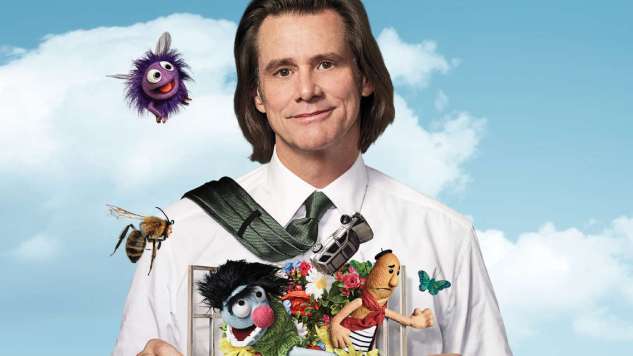Not Kidding Around: Dave Holstein Talks About His New Jim Carrey-Starring Show
Art courtesy of Showtime
“The best show you aren’t watching” is a tag that gets thrown around for a hundred shows per year. The one that it most applies to right now in 2018 is Kidding on Showtime. Jeff Pickles, a Mr. Rogers-ian childrens entertainer, sees his life collapse around him as he enters the fourth decade of his career, with a brutal divorce and the death of a child. What sets this tale of a man surrounded by failure apart is that the man himself doesn’t succumb to that collapse. In current prestige TV, you’ve expect some twist where this guy goes off the deep end and, by season three, Mr. Pickles is executing drug lords in Mexico. An opposite set of cards is in play here. Mr. Pickles is a genuinely good, genuinely kind, genuinely pure person… who seemingly will not break in the face of a bleak, awful world. There are some cracks forming at the edge of the mirror, but they’re less interesting than the persistence of the character. After all, in the face of the current President, perhaps the most involving version of retribution is a man who actually believes in his convictions.
Oh. Also. The main character? He’s played by Jim Carrey, who has returned to television after almost 30 years.
So what kind of person creates the project that coaxes Carrey back to the idiot box, and how do you bridge the dramatic and comedic sides of one of America’s secret weapons? For that we go to Dave Holstein, the producer, writer, and creator of the series. After years of work on Weeds and The Brink, Holstein has brought his dream project to audiences via his dream headliner. Alongside a cast that includes Catherine Keener, Frank Langella, and Judy Greer, this show has everything it needs to be the next great television franchise.
Paste caught up with Dave Holstein to talk about the show, its incredible cast, and and why it was important to avoid the kind of antihero typically found in “Prestige TV” shows.
Paste: Is this a supervillain origin story?
Dave Holstein: Finally. A question I’m excited to answer! It’s the opposite. The show I didn’t want to write is Mr. Rogers Breaks Bad. Not a kind guy who then just crumbles in the face of the universe. In this day and age, I think you’re rooting for the kind of guy who doesn’t curse and who tells the truth and who doesn’t have any cruelty. It’s not about someone trying to break bad; it’s about someone trying to stay good.
Paste: But he’s also committing these inadvertent acts of violence and cruelty. Is the show going to move towards bridging these events or is that part of your vision of goodness?
Holstein: The duality of the character is an essential part of the show. It’s less about the evil and good side of him. It’s not that his dark side is malicious, it’s that he has an anger and he doesn’t know what to do with it. There are moments in the episodes where you see something break, but you don’t see him do it. Or you do see him pull the faucet off the sink. You see the Mr. Hyde that he’s fighting. And maybe that Hyde will win… oh no! Maybe you’re right? Maybe what I’ve done is create a supervillain origin story? But to me, it’s about watching Mr. Rogers for 30 years, and how he never gets angry about anything. Which I find frightening. So the question is: after 30 years, what happens when that guy gets angry about something? What happens when he stubs his toe and it all comes out at once?

Paste: In the first episode, your main character explains stewardship to his son, and how you help everyone, even when you have no responsibility to do so. In line with that 30 year timeline, I know that being good takes a lot out of you, and there’s something untenable about always giving such a large portion of yourself without replenishing. Is that part of what leads to the darkness here? Or does Mr. Pickles have an unending well of effort to give?
Holstein: There’s an unending well of kindness inside of him. Which makes him interesting to write, because it is always good to write with parameters. And for him: he’s not playing a part. He’s the most good person and always sees the good in people and mostly is right in that instinct. The world chips away at that kindness, thought, and you hope that he wins out.
-

-

-

-

-

-

-

-

-

-

-

-

-

-

-

-

-

-

-

-

-

-

-

-

-

-

-

-

-

-

-

-

-

-

-

-

-

-

-

-








































